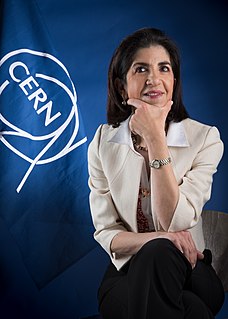A Quote by Geoff Johns
We look at it as the multiverse. We have our TV universe and our film universe, but they all co-exist.
Related Quotes
Although we don't know what is outside our universe, astronomers still wonder. Several pictures of what there might be have been dreamed up. An interesting one, called multiverse, has lots of universes. Picture it as a foam of bubbles. Our universe would be one bubble, and we'd be surrounded by lots of other bubbles.
Some physicists solve that problem of the necessity of finely tuned physical constants ... by invoking the anthropic principle, saying, well, here we are, we exist, we have to be in the kind of universe capable of giving rise to us. That in itself is, I think, unsatisfying, and as John Lennox rightly says, some physicists solve that by the multiverse idea-the idea that our universe is just one of many universes.
When we look at the universe, what we see by eye or with our telescopes is only five percent of the universe. The rest, 95 percent is dark. Dark meaning, first of all, not visible to our instrument. Second, dark also indicates our ignorance. We don't know what's the composition of this part of the universe.
The human mind has a desire to know its place in the universe and the role we play in the tapestry of life. This is actually hardwired into our brains, the desire the know our relationship to the universe. This was good for our evolution, since it enabled us to see our relationship to others and to nature which was good for our survival. And it is also what drives our curiosity to understand the universe.
If our local, observable universe is embedded in a larger structure, a multiverse, then there's other places in this larger structure that have denizens in them that call their local environs the universe. And conditions in those other places could be very different. Or they could be pretty similar to what we have here.
We're all assigned a piece of the garden, a corner of the universe that is ours to transform. Our corner of the universe is our own life - our relationships, our homes, our work, our current circumstances -. exactly as they are. Every situation we find ourselves in is an opportunity, perfectly planned by the Holy Spirit, to teach love instead of fear.
Light is the only connection we have with the Universe beyond our solar system, and the only connection our ancestors had with anything beyond Earth. Follow the light and we can journey from the confines of our planet to other worlds that orbit the Sun without ever dreaming of spacecraft. To look up is to look back in time, because the ancient beams of light are messengers from the Universe's distant past.





































